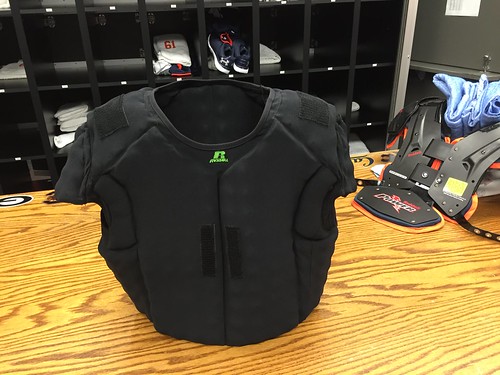Auburn Equipment Manager develops revolutionary shoulder pad system to keep players cool
Article body
Combating the heat in Alabama isn't an easy task, but Auburn University's football team has a new way to stay cool during practice and game days.
Equipment Manager for Auburn Athletics Dana Marquez recently developed a lightweight shoulder pad system that doesn't retain moisture and deflects energy to reduce impact.
"Shoulder pads haven't changed in about ten years," Marquez said. "Everybody's concentrating solely on helmets, and the reality is there are more body injuries in football than there are helmet injuries."
Years ago, Marquez was approached by equestrian coach Greg Williams to create a padding that could be used under an injured horse's saddle. Through research and collaborations with the faculty in the School of Kinesiology, he discovered the shape of the padding was a key element to decrease impact and shifted his focus to shoulder pads.
"I started looking around on the Internet and YouTube, and actually looked at a video of a padding system that was testing itself against M&Ms, and I realized it wasn't the foam—it was the M&M that was doing all the work," Marquez recalled. "Just the sphere shape itself means there's no way to get a direct hit on it, so there's no way to go down. It always deflects left to right, side to side, and that's where the technology came about."
After understanding how a sphere shape effectively deflects, Marquez also added a hole to the middle of the spheres to allow greater impact on the material and to allow energy to escape. Each impact creates energy, or heat, which needs to be ventilated away from the body for an athlete to stay cool.
Once the initial design concept was created, Marquez partnered with Russell Athletics to manufacture the shoulder pad system known as CarbonTek. This system combines an OS Technology foam compression vest and a carbon fiber exoskeleton to provide revolutionary lightweight protection for athletes.
"Being in the South, we're always trying to look at moisture management," Marquez said. "The average shoulder pad will weigh anywhere from eight to 15 pounds when it gets wet, so we were really trying to reduce that weight issue."
Weighing 3.8 pounds while dry, the OS Technology foam is a material that can absorb water without gaining weight. The compression vest only gains approximately a tenth of a pound when completely submerged in water or sweat, which is important during summer practices with temperatures reaching 100 degrees.
The carbon fiber shell in the CarbonTek shoulder pad system maintains its shape throughout tough hits. This exoskeleton is molded to specifically fit each athlete's body and features a military grade buckle system for easier usability. Combined with the compression vest, a custom fit is achieved for maximum comfort and protection.
"Football is a big time collision sport," Marquez said. "The average impact right now in college football is 55 miles per hour; this two piece system can disperse that energy."
After testing the pad system for four years, the product is now in its second generation. Marquez continues to streamline the product with new body lengths and flexibility features by listening to player feedback.
"The biggest thing for us from an improvement stand point of equipment is talking to our athlete and having an open communication with them," Marquez said. "The other thing is having a great communication line with our sports medicine department. They're the ones treating the injury and can let us know what we are trying to protect."
The CarbonTek shoulder pad system is currently worn by Auburn football players, high school football teams and many former Auburn athletes now playing in the NFL. In fact, every NFL team has at least one player who wears CarbonTek, with its popularity only rising with the positive response Marquez receives.
Marquez said he plans to continue working to protect Auburn athletes with the best equipment possible while he continues to dream up new ideas.
"We're going to continue to push the envelope on technology and new developments," Marquez said. "We're doing everything that we can for our Auburn athletes to make sure that they are staying safe."
Related Media
Media interested in this story can contact Communications Director Preston Sparks at (334) 844-9999 or preston.sparks@auburn.edu.
Auburn University is a nationally ranked land grant institution recognized for its commitment to world-class scholarship, interdisciplinary research with an elite, top-tier Carnegie R1 classification, life-changing outreach with Carnegie’s Community Engagement designation and an undergraduate education experience second to none. Auburn is home to more than 30,000 students, and its faculty and research partners collaborate to develop and deliver meaningful scholarship, science and technology-based advancements that meet pressing regional, national and global needs. Auburn’s commitment to active student engagement, professional success and public/private partnership drives a growing reputation for outreach and extension that delivers broad economic, health and societal impact.





